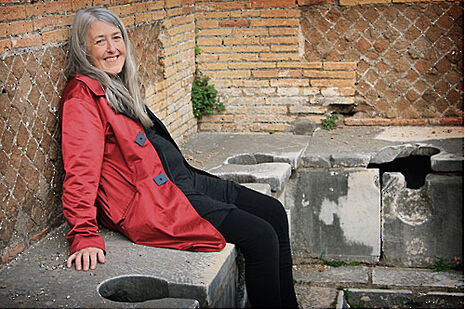TV: Meet the Romans with Mary Beard, Episode Two
Helen Charman is impressed by Mary Beard’s latest offering
Cambridge’s very own Professor Mary Beard, who was educated at Newnham and is now a Professor of Classics at the university, has come under fire from certain sections of the media (and the ubiquitous Twittersphere) this week for daring to present a BBC documentary without brushing her hair. Her rather cheerily titled programme, ‘Meet the Romans with Mary Beard’, however, deserves to be talked about for more relevant and, frankly, more interesting reasons. Whilst it is undeniably refreshing to see a 57-year-old woman on television clearly comfortable with her own appearance, Beard’s programme should be appreciated for what it is: an enthusiastic, entertaining and above all informative look at a much-depicted period of history from a less familiar angle.
Professor Beard is an assured and endlessly engaging presenter, and her desire to view Roman history from “street level” revitalises what could veer towards overfamiliar subject matter. The image she creates of Rome as a “shanty town” is a fascinating one, with her focus on the gritty realities of life as an everyday Roman citizen – “the smell, the dirt, the pubs and the slums” as she memorably terms it- producing a myriad of interesting insights.

Beard is also blessed with an endearing willingness to try anything that results in excellent television: during the episode she plays a game of Tiddlywinks on some ancient stone and at one point actually lies down in the dirt to assess the spaciousness of a room in the Ancient Roman equivalent of a high rise apartment block.
Even bearing this in mind, it is still undeniable that Beard’s best asset as a presenter is, of course, her vast knowledge of her subject, and the programme includes some fascinating moments, particularly its look at the broken amphorae of Monte Testaccio: her engaging explanation of the awe-inspiringly vast spoil heap was full of expertise and interest, as were her musings on the everyday hubbub of the iconic Forum.
‘Meet the Romans’ is by no means perfect, however: at times Professor Beard’s jovial manner becomes slightly overbearing, reminiscent of a jolly-hockey-sticks-and-crumpets schoolmistress from an Enid Blyton novel, and the whimsical background music is, quite frankly, rather sinister. Ultimately, though, these are mild irritations at best: this is the kind of programme-making the BBC excels at, and I for one am now harbouring a substantial envy of the Classicists who are lucky enough to encounter the mighty Mary in her departmental duties.
 News / Colleges charge different rents for the same Castle Street accommodation2 March 2026
News / Colleges charge different rents for the same Castle Street accommodation2 March 2026 News / News in Brief: waterworks, wine woes, and workplace wins 1 March 2026
News / News in Brief: waterworks, wine woes, and workplace wins 1 March 2026 News / Climate activists protest for ‘ethical careers policy’1 March 2026
News / Climate activists protest for ‘ethical careers policy’1 March 2026 News / Angela Merkel among Cambridge honorary degree nominees27 February 2026
News / Angela Merkel among Cambridge honorary degree nominees27 February 2026 News / Private school teacher who lied about Cambridge degree barred from teaching27 February 2026
News / Private school teacher who lied about Cambridge degree barred from teaching27 February 2026









